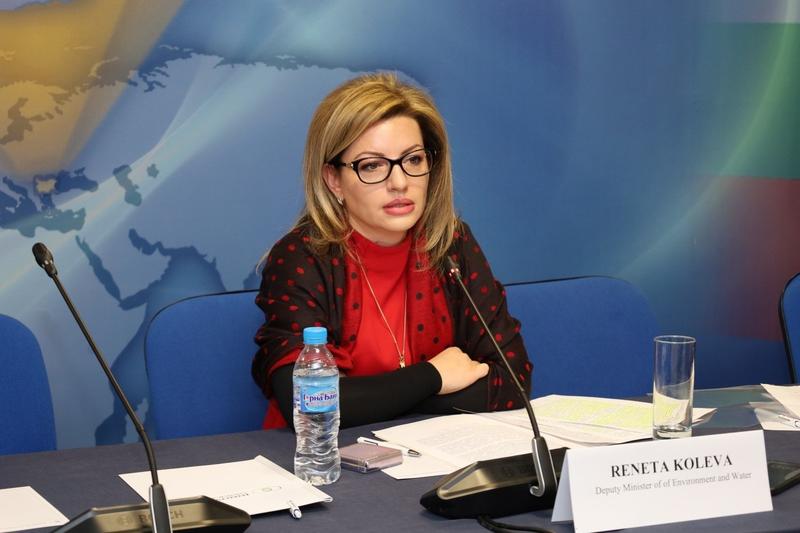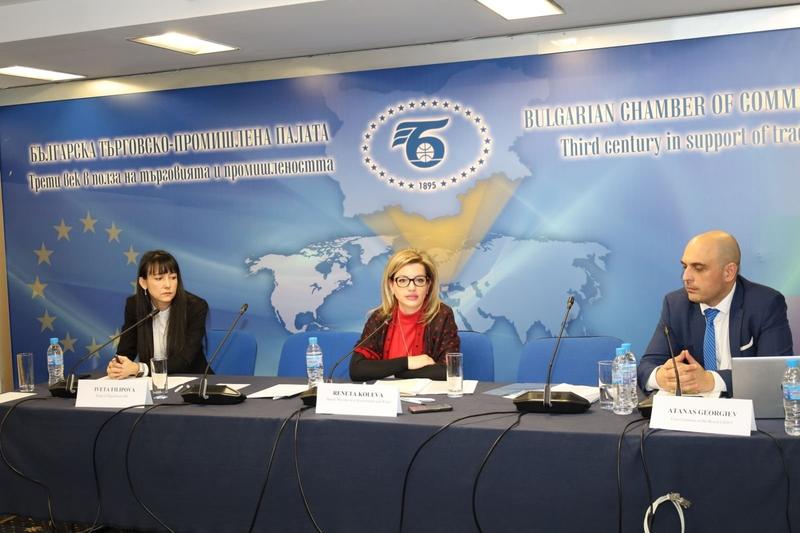Deputy Minister Reneta Koleva: Sustainable transformation and green transition of enterprises are seen as challenges, but these are also opportunities
27 Feb, 2024 | 10:00Eco-innovation plays a leading role in addressing the challenges of resource efficiency, the circular economy, and zero pollution
"Sustainable transformation and the green transition of enterprises are seen as challenges, but these are also opportunities. Eco-innovation has a leading role to play in overcoming the challenges of resource efficiency, the circular economy, and zero pollution." This was stated by Deputy Minister of Environment and Water Reneta Koleva at a discussion on the topic of "Innovation, a leading factor in the development of enterprises and regions - challenges and opportunities in 2024". The discussion was organised by the Council for Innovation, Digitalisation and New Technologies at the Bulgarian Chamber of Commerce and Industry (BCCI) and was held in Sofia.
Within the panel "Sustainable Transformation and the Green Transition of Enterprises", Deputy Minister Koleva emphasized that eco-innovation can provide us with cleaner technologies, business models and products, new management approaches, expanding the knowledge base and improving monitoring as a basis for better decision-making.
According to her, the significant socio-economic benefits should not be overlooked - eco-innovation is a factor for increasing resource effectiveness, optimizing production processes and supply chains, developing and introducing new materials, goods and services, and all this leads to increased competitiveness of the economy, new market positions and business opportunities, higher employment. In order to fully unleash the potential of eco-innovation, we must continue to work to ensure an institutional, regulatory, and investment environment that is supportive of its development.
The Ministry of Environment and Water is implementing a consistent policy to promote good environmental management practices and the transfer of modern environmentally friendly technologies in the industry, Reneta Koleva emphasized. "The activities are aimed at improving the control of the environmental impact of industrial activities through the use of best available techniques (BAT) and the application of the economic viability principle by taking into account the new BAT conclusions in the procedures for issuing, reviewing and updating complex permits. Improving the environmental performance of organisations and increasing the number of organisations registered under the EU's Eco-Management and Audit Scheme (EMAS), as well as increasing the number of products and services with the EU Ecolabel, are also factors in the development of eco-innovation," she explained.
Programme Environment 2021-2027 (PЕ 2021-2027) is to provide support to the industry for waste recycling measures, the deputy minister said. "In order to promote modern and innovative technologies and solutions to implement the waste management hierarchy and the circular economy, it is envisaged that the Programme Environment 2021-2027 (PЕ 2021-2027) will provide support to industry for waste recycling measures. These measures are to be financed through the PE 2021-2027 only through financial instruments in the form of loans for enterprises carrying out waste recycling activities," she explained. The measures cover municipal, industrial and construction waste, in accordance with the Waste Management Act (excluding hazardous waste), and must lead to an increase in recycling capacity, and are also eligible in combination with pre-treatment activities for separately collected waste and/or separate collection of the waste to be recycled.
"The green public procurements can also be a significant incentive for eco-innovation as it encourages the development of markets for environmentally friendly goods and services and innovative partnerships," noted Deputy Minister Koleva and reminded that the amendments to the Public Procurement Act adopted in 2023 oblige public procurers to include in the documentation environmental requirements for the products to be supplied or used for the services provided. "A regulation is currently being developed which will define the product scope, the minimum mandatory environmental requirements for products subject to public procurement, as well as the way for ensuring these requirements are met," Deputy Minister Koleva clarified.
"The MOEW will continue to look for opportunities and work in a spirit of partnership and cooperation with other institutions, the academia, and the non-governmental sector to create the right conditions for innovative solutions in the field of environmental protection, the circular economy and climate neutrality and the implementation of best practices to ensure a zero-emission industry," Reneta Koleva concluded.

